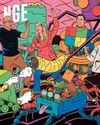
Since then, a couple thousand dog, cat, and horse clones have followed, and every year the waiting list grows longer. Of course it does. Haven't you ever wished your pet could live, if not forever, then at least as long as you? Now it can, sort of.
WIRED spoke to a longtime customer service manager for the largest commercial pet cloning company. She guides pet owners through the entire process, from when they send in a piece of the old pet to when they meet—remeet?—the new one.
HALF OF OUR CLIENTS come to us after their pet has passed away. They're mourning. They're trying to figure out a way to cope with the grief, so they Google "What do you do when your pet passes?" That's when they stumble across us, and I'm often the first person they talk to. There's a lot of emotion. I'm happy to hold their hand through the process, because when a pet dies, especially if it's sudden, many people are not thinking straight. Postmortem, things have to be done very quickly.
After a pet has passed, the cells are viable for about five days. The body has to be refrigerated, but not frozen, because freezing damages the cells. Typically we would want a piece of the ear from the deceased pet. The ear tissue is hardy; it works very well. People don't want to think about their pet missing part of their ear, so that is sometimes a struggle.
Once the sample is at the lab, the first step is to grow cells in culture from the tissue, then freeze and store those cells. When everyone is ready to move forward with cloning, we transfer some of those cells to our cloning lab in upstate New York.
This story is from the {{IssueName}} edition of {{MagazineName}}.
Start your 7-day Magzter GOLD free trial to access thousands of curated premium stories, and 9,000+ magazines and newspapers.
Already a subscriber ? Sign In
This story is from the {{IssueName}} edition of {{MagazineName}}.
Start your 7-day Magzter GOLD free trial to access thousands of curated premium stories, and 9,000+ magazines and newspapers.
Already a subscriber? Sign In

MOVE SLOWLY AND BUILD THINGS
EVERYTHING DEPENDS ON MICROCHIPS-WHICH MEANS TOO MUCH DEPENDS ON TAIWAN. TO REBUILD CHIP MANUFACTURING AT HOME, THE U.S. IS BETTING BIG ON AN AGING TECH GIANT. BUT AS MONEY AND COLOSSAL INFRASTRUCTURE FLOW INTO OHIO, DOES TOO MUCH DEPEND ON INTEL?

FOLLOW THAT CAR
CHASING A ROBOTAXI FOR HOURS AND HOURS IS WEIRD AND REVELATORY, AND BORING, AND JEALOUSY-INDUCING. BUT THE DRIVERLESS WORLD IS COMING FOR ALL OF US. SO GET IN AND BUCKLE UP.

REVENGE OF THE SOFTIES
FOR YEARS, PEOPLE COUNTED MICROSOFT OUT. THEN SATYA NADELLA TOOK CONTROL. AS THE COMPANY TURNS 50, IT'S MORE RELEVANT-AND SCARIER-THAN EVER.

THE NEW COLD WARRIOR
CHINA IS RACING TO UNSEAT THE UNITED STATES AS THE WORLD'S TECHNOLOGICAL SUPERPOWER

CALIFORNIA DREAMIN'
KINDRED MOTORWORKS VW BUS - Despite being German, the VW T1 Microbus is as Californian as the Grateful Dead.

THE INSIDE SCOOP ON DESSERT TECH
A lab in Denmark works to make the perfect ice cream. Bring on the fava beans?

CONFESSIONS OF A HINGE POWER DATER
BY HIS OWN estimation, JB averages about three dates a week. \"It's gonna sound wild,\" he confesses, \"but I've probably been on close to 200 dates in the last year and a half.\"

THE WATCHFUL INTELLIGENCE OF TIM COOK
APPLE INTELLIGENCE IS NOT A PLAY ON \"AI,\" THE CEO INSISTS. BUT IT IS HIS PLAY FOR RELEVANCE IN ALL AREAS, FROM EMAIL AUTO-COMPLETES TO APPS THAT SAVE LIVES.

COPYCATS (AND DOGS)
Nine years ago, a pair of freshly weaned British longhair kittens boarded a private plane in Virginia and flew to their new home in Europe.

STAR POWER
The spirit of Silicon Valley lives onat this nuclear fusion facility's insane, top-secret opening ceremony.